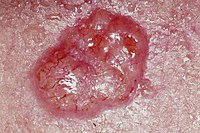
Photo from wikipedia
Numerous studies have unmasked the deleterious effects of particulate matter less than 2.5 μm (PM2.5) on health. However, epidemiologic evidence focusing on the effects of PM2.5 on skin health remains… Click to show full abstract
Numerous studies have unmasked the deleterious effects of particulate matter less than 2.5 μm (PM2.5) on health. However, epidemiologic evidence focusing on the effects of PM2.5 on skin health remains limited. An important aspect of Asian dust (AD) in relationship to health is the amount of PM2.5 contained therein. Several studies have demonstrated that AD can aggravate skin symptoms. The current study aimed to investigate the effects of short-term exposure to PM2.5 and AD particles on skin symptoms in schoolchildren. A total of 339 children recorded daily skin symptom scores during February 2015. Light detection and ranging were used to calculate AD particle size. Generalized estimating equation logistic regression analyses were used to estimate the associations among skin symptoms and the daily levels of PM2.5 and AD particles. Increases in the levels of PM2.5 and AD particles were not related to an increased risk of skin symptom events, with increases of 10.1 μg/m3 in PM2.5 and 0.01 km−1 in AD particles changing odds ratios by 1.03 and 0.99, respectively. These results suggest that short-term exposure to PM2.5 and AD does not impact skin symptoms in schoolchildren.
Journal Title: International Journal of Environmental Research and Public Health
Year Published: 2017
Link to full text (if available)
Share on Social Media: Sign Up to like & get
recommendations!